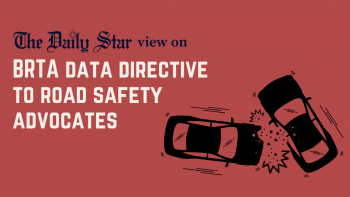Good idea, bad planning

We welcome the government decision to put over 74,000 outdated buses, trucks and other commercial vehicles under crushers. The decision was apparently revealed through a circular issued by the Road Transport and Highways Division (RTHD) earlier this month. According to the Bangladesh Road Transport Authority (BRTA), there are at least 36,123 buses and minibuses that are past their 20-year economic life, while 38,123 trucks, lorries and tankers are past their 25-year life. Ensuring the roadworthiness of vehicles is vital to improve road safety and reduce pollution – both of which we need to work on desperately given the high number of accidents occurring every year and our record levels of air pollution caused, among other factors, by black smoke emanating from old vehicles.
Doing away with unfit vehicles is thus a step in the right direction. However, as typical of any government initiative in Bangladesh, this too risks becoming a victim of poor planning and lax enforcement. Reportedly, although the government set the economic lifespan of commercial vehicles, a guideline on scrapping them has yet to be finalised. Additionally, the gazette on economic lifespan hasn't been published either. The authorities say they would start dumping old vehicles once the gazette is published. But BRTA officials still don't know where to dump those, or for how long those should be kept in their custody.
The authorities will also have to hire contractors to scrap the outdated vehicles. According to the draft Motor Vehicle Scrapping Guideline-2023, the government will be outsourcing the job to enlisted private firms that will carry out the task under BRTA supervision. Officials, however, said the draft guideline and the RTHD circular contained some discrepancies regarding the way private vendors would be hired. This only adds to the concerns given the government's poor history in hiring contractors. Also, there's no clarity on who will eventually foot the bills.
What all these inconsistencies and uncertainties show is that the decision, delayed as it is in a country long known for unsafe roads, has not been planned or coordinated properly. It can only mean further delays in execution, and further trouble when the scrapping begins. We urge the authorities to address these issues before getting started with the project, so that it doesn't get stuck halfway through or end up being a total waste of money and energy.


 For all latest news, follow The Daily Star's Google News channel.
For all latest news, follow The Daily Star's Google News channel. 






Comments